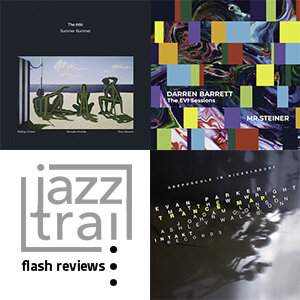Label: Self produced, 2020
Personnel - Javier Rosario: electric and acoustic guitars; Scott Kiefner: bass; Zak King: drums.
Javier Rosario, a Dominican guitarist/composer with an inclination to mix jazz and rock idioms, got inspiration from another guitarist, the ever-explorative Joe Morris, to release his first album, A Celebration of Life. The guitarist benefits from the vast rhythmic avenues open up by his trio mates, bassist Scott Kiefner and drummer Zak King, over which he rides at variable speeds.
“Ghost Town” is a powerful opening tune, where the bandleader interweaves expressive voice leading, pungent chords, and crystalline harmonics with unflinching confidence. Following a clearly pronounced bass solo, Rosario plunges into a distorted metal-like spiral, whose broad dirty sound evolves until reaching the tidal chordal washes that conclude the piece.
“On The Road” is a less-than-two-minute rock exercise that anticipates “Improv”, a spontaneous diligence where fluxes of guitar energy are spilled over King's bickering drum work. Another guitar-drums partnership happens in “Shades of Grey Pt. 1”, a piece whose melodic conduction immediately brings Monk’s “In Walked Bud” into the mind. The second part of this composition incorporates bass and confers more freedom to the drummer.
Revealing a far more introspective side, “Transitions of the Heart” and “Changes of Heart” are solo acoustic guitar pieces delivered with some pathos and colored with a neo-romantic harmonic palette. The trio returns to the rocking ways on “Heading North”, where bass and drums operate in such a way to pass the idea of displacing tempo, and on the album’s closer “Passing Through (Dedicated to Ben)”, in which we find bass lines bouncing with a temperate Latin feel, cymbal-oriented drumming (especially during Kiefner’s soloing), and a punchy guitar work that attains a flammable point whenever fluidity and corrosion are increased.
Sketchy in some cases, these tunes are patterned with instinct and muscle. Even if they don’t completely knock me out, competence is all around for a favorable debut release.
Grade B
Favorite Tracks:
01 - Ghost Town ► 04 - Transitions of the Heart ► 09- Passing Through














































